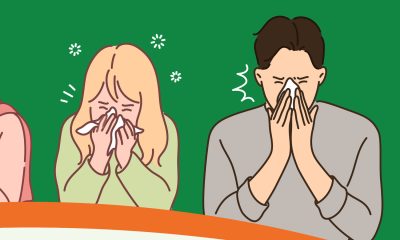By Tom Campbell via SWNS
People who live in polluted areas face a higher risk of catching diseases where the body's immune system attacks itself - including arthritis, warns a new study.
Breathing in fumes from cars and factories on a daily basis could increase people's chances of developing arthritis by 40 percent, say scientists.
They also face higher odds of having other autoimmune conditions like connective tissue and inflammatory bowel diseases.
The number of people affected by these conditions has steadily climbed over the past decade, but the reasons why have remained unclear.
Now researchers at the University of Verona in Italy have come up with a possible explanation - air pollution.
The findings were published in the BMJ journal RMD Open.
Study author Dr. Giovanni Adami said: "Environmental air pollution from vehicle exhaust and industrial output can trigger adaptive immunity - whereby the body reacts to a specific disease-causing entity.
"But sometimes this adaptive response misfires, prompting systemic inflammation, tissue damage, and ultimately autoimmune disease."
Medical information on 81,363 men and women collected by doctors between June 2016 and November 2020 was analyzed by the researchers.
Each participant was linked to the nearest air quality monitoring station run by the Italian Institute of Environment Protection and Research using their zip code
The looked at particle pollution, known as particulate matter, to see whether they exceeded levels considered harmful to human health.
Specifically pollution particles floating in the air with a diameter of 2.5 micrometers (PM2.5) or 10 micrometers (PM10).
People breathing in high levels of pollution were more likely to develop an autoimmune disease, the researchers found.
Long term exposure to traffic and industrial air pollutants increased people's risk of having arthritis by 40 percent.
The same was true for inflammatory bowel disease and connective tissue diseases, which jumped by 20 and 25 percent respectively.
Last year, 42 British towns and cities were named by the World Health Organization (WHO) for breaking pollution limits.
Warrington topped the UK's most polluted list, followed by Bristol, Stanford-Le-Hope, Storrington and Swansea.
A lack of information on the dates when people were first diagnosed with an autoimmune disease or started showing symptoms may have affected the study's findings.
Also, the air quality monitoring centres may not have accurately reflected each person's level of pollution exposure.
Finally, the findings might not apply to everyone given most of the participants were women (92 percent) with an average age of 65.
Dr. Adami added: "The findings might not be more widely applicable because study participants largely comprised older women at risk of fracture.
"But air pollution has already been linked to immune system abnormalities, and smoking, which shares some toxins with fossil fuel emissions, is a predisposing factor for rheumatoid arthritis."

 Parenting1 week ago
Parenting1 week ago
 Lifestyle7 days ago
Lifestyle7 days ago
 Wildlife3 days ago
Wildlife3 days ago
 Good News4 days ago
Good News4 days ago
 Health4 days ago
Health4 days ago
 Entertainment22 hours ago
Entertainment22 hours ago
 Work2 days ago
Work2 days ago
 Travel4 days ago
Travel4 days ago




















